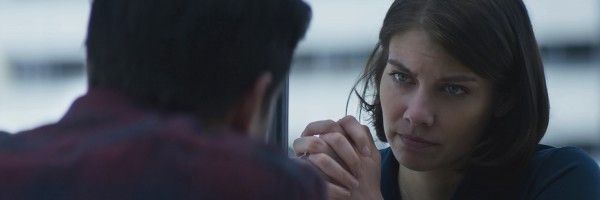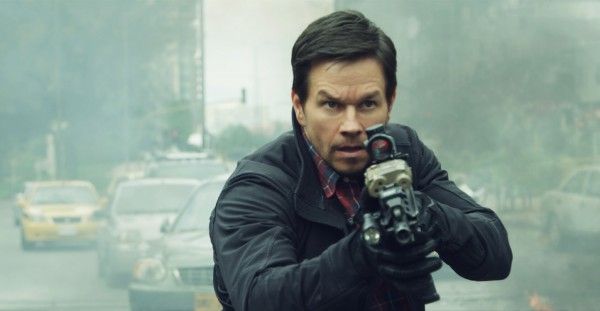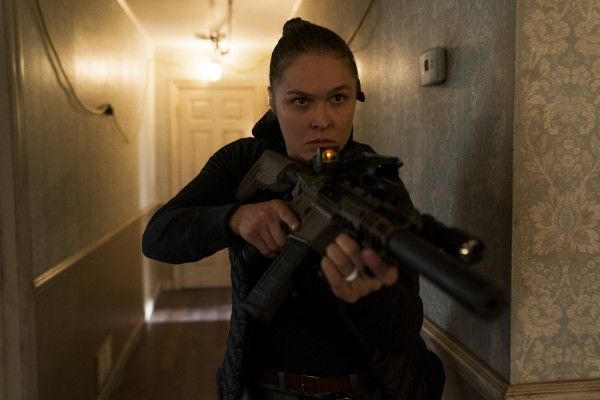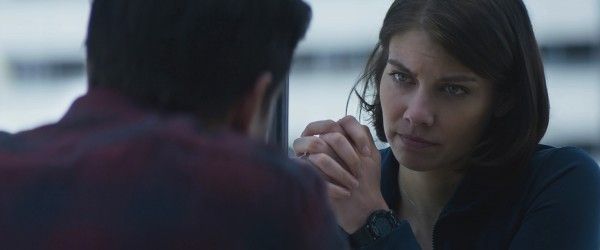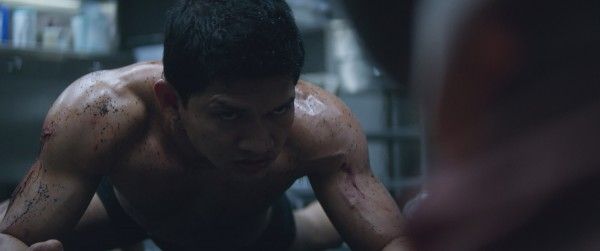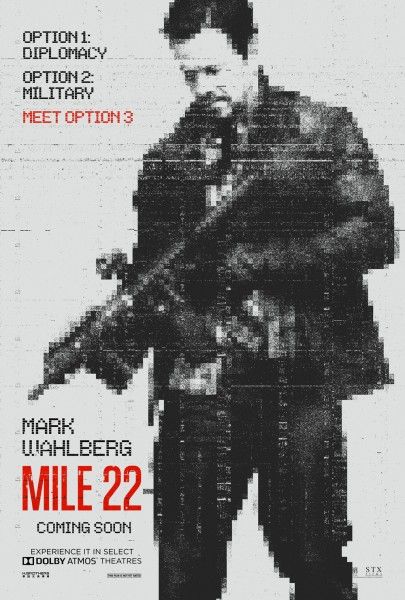Lauren Cohan’s no stranger to the action-adventure genre. As Maggie Green on The Walking Dead, the actress has shot/diced/impaled/stomped her way through the zombie herds. So jumping into a Peter Berg action film should be a cakewalk; yet for Cohan, Mile 22 wasn’t as easy a transition as it would seem on paper. On The Walking Dead, everyone’s adjusting to life in the post-apocalypse, so they don’t have to be experts with firearms and the correct combat procedures; whereas in Mile 22, as a CIA ground agent, Cohan had to be completely proficient with such techniques – as if it were the same as brushing her teeth or driving. Cohan joked that by the end of shooting, she had become so proficient with firearms and combat drills, that when she returned to The Walking Dead, she had to unlearn everything she was taught to fit back in on the show.
In Mile 22, Cohan costars as Alice Curr, part of an elite task force (led by Mark Wahlberg), assigned to transport a police officer (martial arts star Iko Uwais) twenty-two miles out of a hostile country. Alice struggles with balancing her personal life (a young daughter, waiting on her at home) with her increasingly dangerous profession. When the team’s mission goes belly-up, Alice begins to question her role within the task force and whether she can continue on.
In the following on-set interview with Lauren Cohan, she discusses auditioning for the role, learning Indonesian for her scenes with Iko Uwais, and working on set with filmmaker Peter Berg. For the full interview, read on below.
Tell us a little bit about your character and her relationship with the rest of the team in this movie.
Lauren Cohan: Alice Curr is a CIA ground branch operative, and this group, pretty early on in the movie, discovers that they need to go further undercover on a very special mission with a very specific asset, and it takes them on a wild adventure…
Did the character change at all from the initial script to production?
Cohan: Not too much. I think the essence of her was always a little bit fierce; slightly reactive within a personal space, but very buttoned up within her job space. That was definitely what appealed most—the necessity to completely turn off and compartmentalize her life, but still display and access these very vulnerable and raw emotions when it comes to her family.
Do you feel as if your character changed through the process as you worked with Peter Berg?
Cohan: It's not like I read [revisions] and then thought, 'Whoa, she's totally different," I just read it and I say, "Great, this is an awesome template, now we can go and just explode everything." She's still the person that's in the script for sure, but there's so much freedom in the way that Pete directs and works with us. I've said it to him probably 14,000 times that we're completely spoiled for everything else now, because it's a very free, very buoyant energy…
For some of these scenes, which are very serious and intense, it's amazingly light-hearted and fun to get there and to find [the scene]. I just feel there's no wrong. There's just—he communicates with us throughout the whole thing. It's like we're all really in it together, and you don't feel the stiffness sometimes that you get when you have to get yourself back in the moment, and cut and stop and start again and find it. It's such a living, breathing process the whole time.
What's it like being on a team with all of these professional fighters?
Cohan: Awesome! I think the most fun part of it is that people aren't going to see what they're expecting to see. I mean Ronda does barely any fighting in this movie, and we just get a chance to see what an amazing actress she is. Yet all the things that I think make her incredibly lovable: her perseverance and her strength and the fact that she never gives up and pushes, and pushes, inform this character.
This has been really an original, unique experience for me. Pete has put together people that really feel like a team. We get along so well. We get to drive around in crazy cars and do explosions, and be badasses, but there's so much continuity between us all as a team and as a crew, and as a cast. There's so much calm in the crazy.
Ronda mentioned that she was in an earlier iteration of the script, and that when they did this version, her character was split in two, and a lot of the emotional aspects of her character were given to yours. Can you elaborate a little bit about the emotional aspects of your character?
Cohan: Yeah. I never saw any of the other scripts, the only one I saw was the one that we're working from, but what I find interesting about this character is how she has to compartmentalize everything. She has this life, a daughter at home that she doesn't get to see. Yet this ground branch operative life is the one that she chose, but she's really at a point now where she's ready to not need to make so many sacrifices. What's interesting with all the characters is that they're really straining at the seams.
Everybody is just ready to be done, whether or not they know what that even looks like, and how they'd even be in a life where the mission didn't come first. That's what's so heartbreaking in the film, seeing the bond that Ronda and Alice, and ultimately Lee… how that challenges why they chose this life in the first place, and why they continue doing it…
Is your character like the, "One more and I'm out” type?
Cohan: Essentially, yeah. It's like, "This is the last heist. Then I'm going to go back and have a normal life." That's a big part of the relationship with Silva and Alice. He drills into her over and over things that she already knows, but she begins to question them and that threatens his motivation too.
As an actor, what is the pressure to not mess up in action scenes, because they're so elaborate to stage?
Cohan: The notion of messing up doesn't even exist, because you just keep going. The way that Pete shoots, you just keep going and if something's not quite right, or you want to go back, we don't have to start the whole thing over again…
The stuff in the car was so especially fun, because we had the four of us driving so fast we couldn't actually hear the direction very well. So if somebody hears the direction, it’s like, "Okay, it was this.” So it really informs the team that we are in the film, that we have each other’s back. You don't even have time to worry if you're doing it right, because you're going to get told if you're not and it's going to be okay, so you just kind of keep going.
We heard about the cast working in Atlanta before the shoot with SEALs and Rangers, and I wanted to ask how that might have influenced the team dynamic between the actors, and also how you built your character in this improv-like environment?
Cohan: We had such an extensive amount of rehearsal that it really freed us up in the improv environment. We trained with some of the best men that can train you at being really proficient with weapons. I had an exhaustive amount of training on loading and reloading every different type of gun, and firing.
Pete [said], "You're not going to come away from this film able to look like you can play this character. You're going to actually come away from this film with a new skill." That's completely true. I feel like I we've been through a Navy SEAL, CIA, Peter Berg boot camp.
How is the firearms training different on this than on The Walking Dead?
Cohan: On Walking Dead, we're never really supposed to look like we’re assassins. In this -- you have to look like it's completely second nature and it's been years. You just can do it in your sleep.
Why did you want to go after this role?
Cohan: I had an opportunity to audition for the film, and I made the audition tape, and like most things, especially when it feels really right, it's easy to let it go after you've done the audition. I was like, "Well, I know I connected with it," and it's either supposed to be or its not supposed to be. The process was really fast. So much faster than anything I've ever done. I did the tape and then I got feedback, and they were like, "Pete really liked your tape."
Then we had a cup of coffee, and on the spot he was like, "I love your tape, it was exactly what I wanted. Do you want to do the movie?" I stood up and I thought, "I have to walk out of this restaurant quick enough before I start crying," because it was such a cool experience to actually have such an organic, simple, no bullshit connection. That's him in a nutshell.
Could you give an example of Peter’s attention to detail when directing?
Cohan: We have a scene where I'm supposed to interrogate Iko [Uwais], and right at the beginning of rehearsal, Pete was like, "See if you can learn some of this in Indonesian." We had a couple of weeks where we were just rehearsing. Actually, I was still doing Walking Dead, but for most of that time, we were rehearsing for the weapons and fights and all this kind of stuff. I was hanging with Iko and Ryan, who's an interpreter, and I just said, "Can you teach me every single dialogue scene that Iko and I have? I want to learn all of it in Indonesian." So we had it at our disposal. It's a really beautiful, fun language to speak too. So we went to do the interrogation scene, and Iko had it all perfectly down in English and Indonesian, and vice versa. So we were able to be really fun with it and really spontaneous. Pete was like, "Why did you guys learn that?" And we were like, "You told us to learn it!"
Mile 22 hits theaters everywhere August 3, 2018

